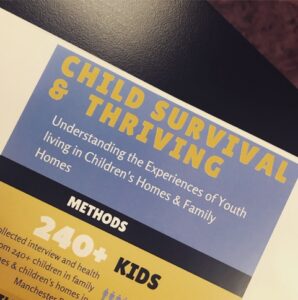Engaged Anthropology Grant: Robin Nelson

In 2011 Dr. Robin Nelson received a Post-Ph.D. Research Grant to aid research on “Residential Context, Non-Kin Care and Child Health Outcomes in Jamaica”. After being awarded an Engaged Anthropology Grant in 2016 Dr. Nelson had the opportunity to return to the field to carry out her project, “Talking Back: Community Dialogues, Residential Care Settings, and Child Thriving in Jamaica”.
In 2010, I began wondering if we could study contemporary manifestations of parental investment and alloparenting when the home, as it is typically constructed in Caribbean communities, is unavailable. With this project, “Residential Context and Non-Kin Care in Jamaica,” I investigated the growth and development of children living in state-regulated institutional care settings, or children’s homes, as compared to their peers living in familial homes. Over the course two field seasons my research assistant, Bridgett Robinson, and I collected ethnographic and biometric data from over 200 children living in a variety of care settings in Manchester Parish, Jamaica.

Families in Jamaica, like their counterparts around the world, are fluid and dynamic entities responding to external stressors and interpersonal dynamics. Due to its colonial history and proximity to the United States, Jamaica’s economy is largely dependent upon the exportation of goods and laborers to other, often larger, countries. Economic shocks, the devaluation of the Jamaican dollar, and the policies of the International Monetary Fund and World Bank have created systems that have left many Jamaican families economically insecure. Financial precarity and the out-migration of adult women, coupled with long held practices of communal caregiving have resulted in many children being cared for by extended family. When family members are unable to provide appropriate care or when children experience neglect or abuse from either their parents or extended kin, state-regulated children’s homes often become a child’s primary home setting.
In this study, we found that children living in familial homes were experiencing better growth and health, as assessed by measures of height, weight, skinfold thickness, and immunological function, than their peers living in children’s homes. However, the residents of one children’s home had growth outcomes that were comparable to their age and gender matched peers living in familial homes. These growth outcomes were correlated to the receipt of supportive psycho-social care. Additionally, girls were generally healthier than their male peers at both the initial period of data collection, and two years later.

With this Engaged Anthropology Grant, I returned Manchester Parish and Kingston Jamaica in 2018 to disseminate the findings from my 2011-2014 study on the lives of children living in institutional care settings. Over the course of a few weeks, I shared an infographic of my findings, and my published articles with officials at the Child Protection and Family Services Agency in Kingston, Jamaica, and the directors of the children’s homes that were involved in my study. I also spoke to community members about the findings in several informal meetings. The Child Protection and Family Services Agency in Kingston, Jamaica is the primary government organization responsible for the well-being of children throughout the country. In this capacity, they both monitor reports of neglect and abuse of children living in familial homes, and assess the quality of care provided to children who have been removed from natal homes and placed in institutional or foster care settings. It was vital for me to share my findings with these officials as they provided permissions for the collection of data in children’s homes throughout the country.
While only 320 square miles in size, Manchester Parish in the central mountainous regions of Jamaica, is home to six children’s homes. Qualitative information gathered from the directors and staff of these children’s homes provided key information central to the framing of the findings of this study. These interviews were central to both the completion the study and analyses of these data. In meetings with these directors during this return trip, I learned of continued challenges facing the directors of the children’s homes including limited funding, and the need for clinical psychological support. I also learned of on-going successes including the creation of new facilities, high achieving student residents, and trips abroad for some of the children.
The development of The Engaged Anthropology Grant, and my receipt of this funding marked a shift in the way that I both conceive of and plan my research projects. By overtly valuing public research, The Wenner-Gren Foundation enables anthropologists who are committed to this kind of work to actively involve the publics in our research. For me, this means being provided the opportunity to both explain my findings to directors of children’s homes who supported my study, and gaining the opportunity to receive their valuable insights about this research. It also enabled me to return to the community and meet with families who granted me entree into their homes. It has informed the development of future projects. An ethically minded Anthropology requires a commitment to working in collaboration with community members rather than simply “in” communities, and engaging with the public about both the development of our research and our findings.